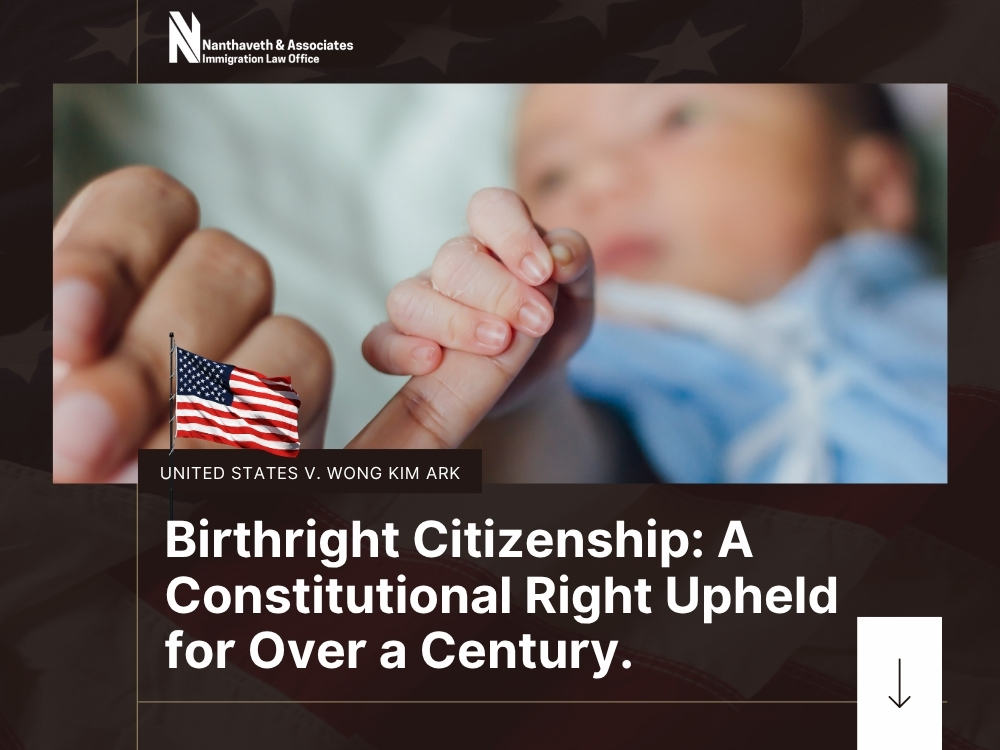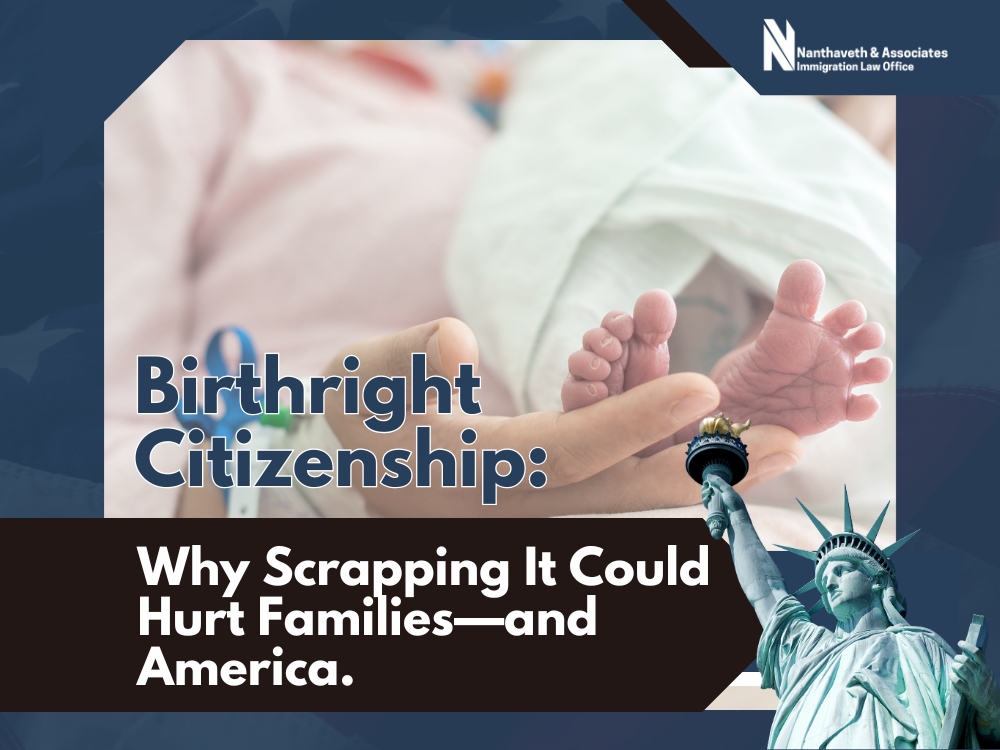Can Birthright Citizenship Be Revoked?

Navigating the world of immigration law can be tricky, especially when it comes to birthright citizenship.
This article aims to simplify this complex topic by exploring its history and legal background. We'll also discuss current issues like "birth tourism" and what could happen if birthright citizenship is repealed. If you're considering dual citizenship, we'll cover how this might affect your birthright citizenship status.
And remember, if you're feeling overwhelmed or concerned about these topics, it's a good idea to talk to an immigration lawyer - we offer consultations and can provide advice tailored to your situation.
The History of Birthright Citizenship in the U.S.
 Birthright citizenship is a solid and storied tradition in the United States, with deep roots reaching back well over 100 years.
Birthright citizenship is a solid and storied tradition in the United States, with deep roots reaching back well over 100 years.
In fact, it is a constitutional right. Section 1 of the Fourteenth Amendment to the Constitution states “All persons born or naturalized in the United States, and subject to the jurisdiction thereof, are citizens of the United States and of the state wherein they reside.”
This means that any person born on American soil is immediately provided with citizenship as a birthright. Such rights are conferred no matter the status or citizenship of their parents.
United States v. Wong Kim Ark
In the 1800s, the Supreme Court upheld birthright citizenship. In United States v. Wong Kim Ark, the defendant was an American-born son of two Chinese parents. Born in San Francisco in 1873, Wong Kim Ark continually lived in the U.S. with his parents. When they returned to China in 1890, he took two trips by sea to visit them. Each time, Wong Kim Ark returned to the U.S.
After the first trip, the U.S. admitted Wong Kim Ark under grounds of birthright citizenship. But upon his return the second time, he was denied entry, with the official stating he was not a citizen of the U.S. but of China. The court ruled in 1898 that the Fourteenth Amendment guaranteed citizenship to any person born in America, and no state can impinge upon this right.
What Countries Have Birthright Citizenship?
Over 30 countries across the world, including our neighbors Canada and Mexico, provide birthright citizenship to anyone born within their territories. Therefore, it is an easy way to establish citizenship for the majority of the population.
It’s also a clear cut and simple system. For natural-born citizens, a birth certificate is all that’s needed to prove U.S. citizenship. Birthright citizenship keeps government oversight low. This is because there’s no need to require applications or reviews to establish citizenship for all those born within the country.
The Future of Birthright Citizenship in the U.S.
Birth Tourism
For some time, foreign nationals have come to the United States for the sole purpose of giving birth, also known as “birth tourism”. Since any child born on American soil is a citizen, the child born to a foreigner would have full citizenship.
This practice has gained national attention over the years and has drawn the ire of those critical of immigration. While there are instances of illegal birth tourism, most mothers who enter the U.S. to have their babies do so legally. Because birthright citizenship makes birth tourism possible, it is not surprising that anti-immigration advocates would target this Fourteenth Amendment right.
What Happens If Birthright Citizenship is Revoked?
 Some see the elimination of birthright citizenship as a simple solution to a complex problem. Yet, such action is riddled with potential unforeseen and undesirable effects. A Migration Policy Institute study revealed that unintended consequences awaited the U.S. should it eliminate birthright citizenship.
Some see the elimination of birthright citizenship as a simple solution to a complex problem. Yet, such action is riddled with potential unforeseen and undesirable effects. A Migration Policy Institute study revealed that unintended consequences awaited the U.S. should it eliminate birthright citizenship.
Instead of mitigating undocumented immigration concerns, it would likely heighten them. The MPI reports that elimination of rights for children of undocumented immigrants could increase the undocumented population by millions, possibly even doubling it by 2050. This would effectively create a new permanent underclass, according to the American Immigration Council (AIC), susceptible to prejudice and victimization.
Further, the current system of birthright citizenship is organizationally simple. It allows anyone born in the United States to prove citizenship with a birth certificate. Without this, options become more costly and complicated. The AIC expertly outlines several ways the elimination of birthright citizenship would affect everyone – not just foreigners or immigrant families.
For example, without birthright citizenship, derivative citizenship would burden citizens and the government. The process would be lengthy, costly, and inefficient. The AIC also points out that without birthright citizenship, many Americans would likely be denied citizenship due to government oversight or error, leading to undue stress and additional processing times.
Additionally, the elimination of birthright citizenship would put hundreds of thousands of U.S. children with undocumented parents in danger of deportation. Raised in America and naturally-born U.S. citizens, these children would see their rights pulled out from under them. The result of such actions would be catastrophic for families. It would also be detrimental to the functioning of the U.S. as a whole.
Could The U.S. Eliminate Birthright Citizenship?
United States v. Wong Kim Ark interpreted birthright citizenship rights via the Constitution and established legal precedent over 100 years ago. Only Congress could adjust the Constitution via amendment. Yet, this requires a two-thirds majority in both the House and the Senate.
Such an occurrence is not likely to happen anytime soon. Even further, if an amendment were to pass Congress, three-fourths of states would need to agree to it – again, unlikely to happen in America today.
Countries That Revoke Birthright Citizenship
Every country has different citizenship requirements and birthright citizenship isn’t always as protected as it is in the U.S. There are many reasons why a country may revoke your citizenship including committing certain crimes such as terrorism or even sometimes treason, living abroad permanently, serving in a foreign military or government, failure to reaffirm one's citizenship by a certain age, failure to revoke other citizenships by a certain age, adoption by a foreigner, and loss of citizenship by parents.
The most common reason we encounter loss of citizenship is the country not allowing dual citizenship. Many countries do not allow you to be a citizen of two countries so if you are naturalized in another country, your birthright citizenship could be revoked. It’s important to understand your country’s citizenship requirements, especially when going through naturalization, to ensure you maintain your citizenship.
Contact an Experienced Immigration Attorney
If you have concerns about birthright citizenship or the rights of yourself or a loved one contact an experienced immigration lawyer. An attorney specializing in immigration law can help guide you and your family. The lawyers at Nanthaveth & Associates work tirelessly to serve immigrants and their families in Austin, Texas. You can contact us to schedule a consultation.
